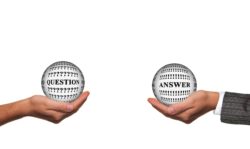
A couple of weeks ago, we talked about the six kinds of pronouns. Then last week we talked about some of the issues with using personal and intensive/reflexive pronouns: things like I versus me; and I and me versus myself. Today, we will talk about the issues with interrogative and relative pronouns since they look almost the same, although they are used differently.
Interrogatives
First, please note that the five interrogative pronouns are NOT the same as the five journalistic questions. The journalistic questions are Who, What, When, Where, and Why. The only two of those that are pronouns are who and what. The interrogatives are who, whom, whose, what, and which.
The issue with the interrogatives is WHO versus WHOM. If you are ever in doubt, use who. An incorrect who will likely go unnoticed, but an errant whom sounds just plain weird. The thing with who and whom is the same as the thing with I and me: case. Who is used as a subject, like I; whom is used as an object, like me. How do you figure out which one to use? There are a few ways:
- Look for the verbs in the sentence. Find the subject for each verb. If your who/whom appears to be a subject, use who. If all the verbs have other subjects you have identified, and none of the subjects is your who/whom, it is likely an object and you can use whom.
- Answer the question. Who/Whom are you taking to the movie? I am taking her. Therefore, use whom. It isn’t I am taking she. Who/whom is coming to the party? They are coming to the party (not them). So use who.
- If the who/whom comes right after a preposition like with, by, for, at, to, etc., use whom — even if the preposition is put at the end of the sentence and the who/whom is at the beginning. Who/whom are you going with? I am going with him. Use whom. To who/whom are you giving that gift? Since it comes directly after to, use whom.
The interrogative pronoun is whose and not who’s. Whose book is that?
The other two interrogatives, which and what, can also be used as adjectives, but the distinction will not cause any problems.
What is that? (pronoun). What book are you reading? (adjective)
Which are those? (pronoun). Which way are you going? (adjective)
Relatives
The problem with the relative pronouns is mainly whether to use that or which. Then, of course, wherever there is a who or whom, there is a problem.
- That is generally used without a comma for clauses that are necessary for the meaning of the sentence (essential clauses): Here is the book that I told you about. You need that I told you about for the sentence to make sense. It tells you which book. You should read this book, which was a bestseller last year. In this case the clause is added information, sort of a “by the way.” Because you said this book, the person you are talking to probably knows the book you mean, Therefore, use a comma and which.
- For people, we generally use who, with or without the comma. For a group of peoples you can use that: He is the boy who plays football. The boy who plays football, who is also a great student, is in 10th grade. The native American tribe that is from my town has a monument in the town square.
- Who and whom are the same in relative clause use as they are as interrogatives. Who is a subject and whom is an object. (Remember that after the verb is or was or are (the to be verb) you use the subject form. You can use the same methods to figure out whom versus who as in the interrogatives. You won’t be able to answer the question, though, because they are not questions. But you can turn it into a question and answer it. I have a cousin who is an astronaut. My cousin, whom I haven’t seen in ten years, is coming to visit. (Have you seen your cousin? No, I haven’t seen him in ten years. So it is whom.)
Here is a little quiz on relative and interrogative pronouns. Scroll down for the answers:
- (Who, Whom) are you talking to on the phone?
- I know a girl who can bend all the way backwards. (comma after who or not?)
- Please tell me (who,whom) you are choosing for the lead in the play.
- The people (who, whom, that) are talking in the corner are the executives.
- The movie (that, which) I saw last night was scary. (comma?)
Answers:
- whom
- no comma
- whom
- either who or that
- that – no comma
What’s Next?
Next week will be the end of the pronoun series with a discussion of demonstrative and indefinite pronouns.
The following week will likely be a guest post.
Then, I might run some Best Of the Grammar Divas with hopefully some other interesting info I find on the Internet until I get moved to Florida, when I will resume the parts of speech series.



Leave a Reply